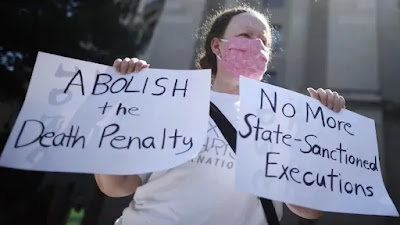Protest after Pakistan Christian given blasphemy death sentence
By AFP
July 2, 2024

Around 60 demonstrators gathered in the southern city of Karachi - Copyright AFP Rizwan TABASSUM
Sabina QAZI
Pakistan minority rights campaigners protested Tuesday after a Christian man was sentenced to death for sharing an allegedly blasphemous TikTok post.
The image included the accusation that the holy book was damaged by two Christian brothers and it was widely shared in August, after which a mob razed a Christian enclave.
On Tuesday around 60 demonstrators gathered in the southern city of Karachi, carrying banners decrying the “misuse of blasphemy laws”.
“Day by day, Pakistan is becoming a country where minorities aren’t safe anymore,” said Christian pastor Ghazala Shafiq.
“People can do whatever they want to do with us,” the 59-year-old told AFP.
More than 80 homes and 19 churches were ruined by crowds in the eastern city of Jaranwala last August.
The two Christian brothers were initially arrested for blasphemy but released after investigators believed they were framed over a personal grudge, according to domestic media.
The man convicted of blasphemy by the court in eastern Sahiwal city was 27-year-old Ehsan Masih, his lawyer Akmal Bhatti said.
“He shared the page on his TikTok without any understanding of what it was,” Bhatti said, explaining his client was illiterate.
“He did not write anything with that post, did not add anything himself that could be considered blasphemous,” added the lawyer.
Human Rights Watch warned in March that “Pakistan’s blasphemy law has long been used abusively to carry out personal vendettas or prosecute members of minority religious communities”.
Hundreds of Christians fled Jaranwala’s Christian quarter last summer when around 5,000 people surged in, setting churches ablaze and raiding homes.
The crowd was spurred on by announcements through the loudspeakers of mosques that a Koran had been torn, scrawled with offensive words and stuck to the walls of a local mosque.
Police in eastern Punjab province say only a dozen of those involved in the mob violence will face trial.
Christians, who make up around two percent of Pakistan’s population, occupy one of the lowest rungs in society and are frequently targeted with blasphemy allegations.
“The people responsible for the riots in Jaranwala are still awaiting trial, while he has already been given the death sentence,” said lawyer Bhatti.
“The judgment was biased due to his faith,” he added.
“It was the speeches from the mosques that instigated the riots, not this post on social media.”
The last executions in Pakistan took place in 2020, according to Amnesty International, and convicts can languish in dire conditions for years on death row.

Around 60 demonstrators gathered in the southern city of Karachi - Copyright AFP Rizwan TABASSUM
Sabina QAZI
Pakistan minority rights campaigners protested Tuesday after a Christian man was sentenced to death for sharing an allegedly blasphemous TikTok post.
The image included the accusation that the holy book was damaged by two Christian brothers and it was widely shared in August, after which a mob razed a Christian enclave.
On Tuesday around 60 demonstrators gathered in the southern city of Karachi, carrying banners decrying the “misuse of blasphemy laws”.
“Day by day, Pakistan is becoming a country where minorities aren’t safe anymore,” said Christian pastor Ghazala Shafiq.
“People can do whatever they want to do with us,” the 59-year-old told AFP.
More than 80 homes and 19 churches were ruined by crowds in the eastern city of Jaranwala last August.
The two Christian brothers were initially arrested for blasphemy but released after investigators believed they were framed over a personal grudge, according to domestic media.
The man convicted of blasphemy by the court in eastern Sahiwal city was 27-year-old Ehsan Masih, his lawyer Akmal Bhatti said.
“He shared the page on his TikTok without any understanding of what it was,” Bhatti said, explaining his client was illiterate.
“He did not write anything with that post, did not add anything himself that could be considered blasphemous,” added the lawyer.
Human Rights Watch warned in March that “Pakistan’s blasphemy law has long been used abusively to carry out personal vendettas or prosecute members of minority religious communities”.
Hundreds of Christians fled Jaranwala’s Christian quarter last summer when around 5,000 people surged in, setting churches ablaze and raiding homes.
The crowd was spurred on by announcements through the loudspeakers of mosques that a Koran had been torn, scrawled with offensive words and stuck to the walls of a local mosque.
Police in eastern Punjab province say only a dozen of those involved in the mob violence will face trial.
Christians, who make up around two percent of Pakistan’s population, occupy one of the lowest rungs in society and are frequently targeted with blasphemy allegations.
“The people responsible for the riots in Jaranwala are still awaiting trial, while he has already been given the death sentence,” said lawyer Bhatti.
“The judgment was biased due to his faith,” he added.
“It was the speeches from the mosques that instigated the riots, not this post on social media.”
The last executions in Pakistan took place in 2020, according to Amnesty International, and convicts can languish in dire conditions for years on death row.


No comments:
Post a Comment